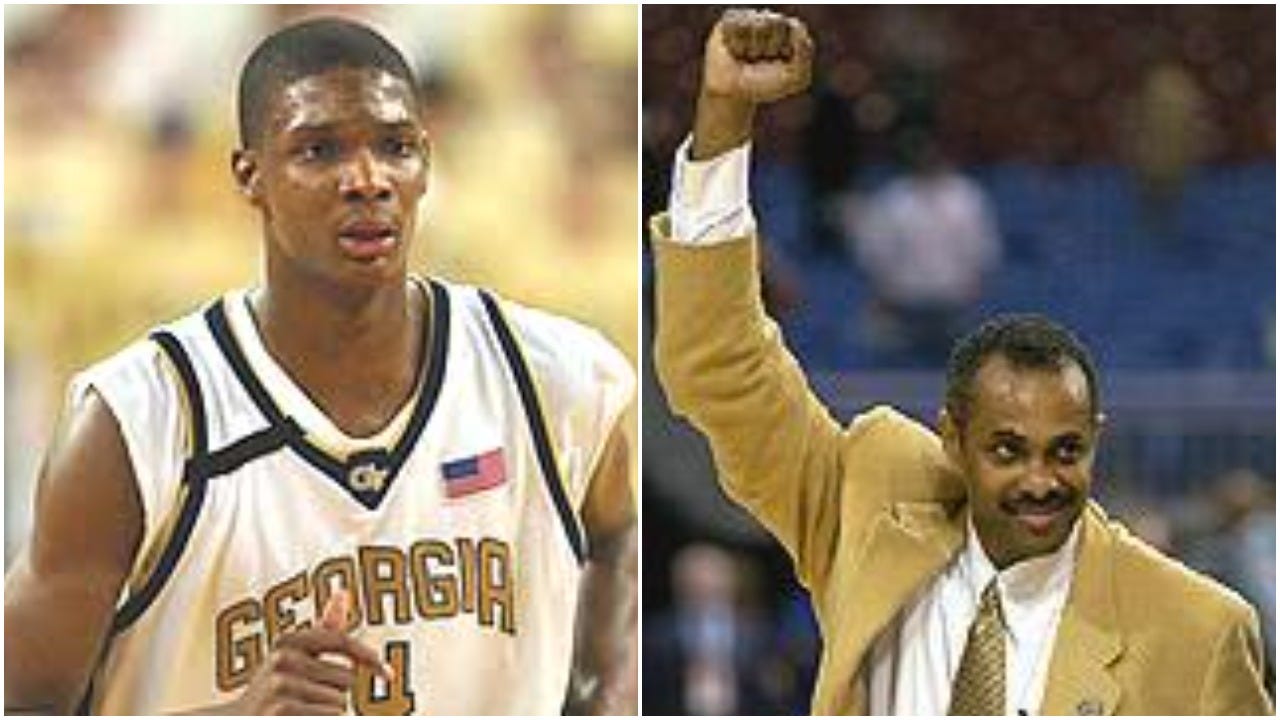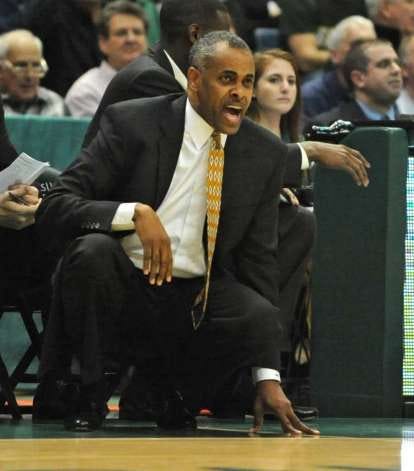Let's get Paul Hewitt his flowers
Coach Hewitt made Georgia Tech the place so many young players—including myself—needed it to be
When people hear where I went to college, the general reaction tends to be surprise. “Why,” they ask, “didn’t you go to a big school, like Duke or UNC or Texas?” My response is always the same: to me, Georgia Tech was that school. Hell, it had more students than my hometown had people. It belonged to the ACC, a conference full of teams I grew up watching. But most of all, the GT Yellow Jackets were coached by a man who went on to change my life and career, before I even knew it was a career.
I’ve written a bit about Paul Hewitt before: how he taught me that balancing athletics with education and civic duty wasn’t an option—it was necessary. But there’s more I want to say about Coach Hewitt, and to do so, I have to back up. Two decades, to be exact. Because when you’re a 16 or 17-year-old kid with a talent for basketball—if you’re seriously good at anything that young—something funny happens. It stops being about just you.
You may become the pride of your family. Depending on your circumstances, you may even become their chance at salvation. To your greater community, you become a beacon of hope. And all that comes with a good deal of responsibility, because a whole bunch of people are banking on you to succeed—whether you know it or not.
The recruiting process puts a lot of voices in the young ears of high school athletes, with little time to process what the coaches and teachers and everyone else are actually saying—and even less time to realize that, after all that, your childhood is over. No one’s thinking about you being a kid. They’re thinking about what you need to work on and who you need to talk to next. Is that fair to a kid? Hell no. But that’s how it tends to go.
I was lucky to be raised in a family that valued education above all else. But by the time I was 17, I knew I wanted to play basketball professionally. I probably could have told you so ten years earlier, to be honest.
Once I was in high school, it was off to the races. I couldn’t have gotten more mail if I’d signed up for every coupon service in the world. Offers were coming in from colleges across the country. But none of that changed the fact that my family was toeing the poverty line. A scholarship wasn’t even a conversation—it was a necessity. It was the only way to a higher education.
Our house phone started ringing off the hook, but instead of friends and family on the line, now it was top-tier college coaches. It’s overwhelming to suddenly be talking to people you’ve seen on TV, pacing the sidelines during March Madness—overwhelming enough that you might not even realize when you’re being taken advantage of. One college coach—I won’t say who—tried to force an early commitment out of me by telling me that another player was about to commit and take my potential slot.
I was lucky enough not to fall for that one. Turns out that player and I had a conversation later on and he said they told him the same thing! I was even luckier, though, to have an extended family that had been holding me to a high standard my whole life and wasn’t going to stop now. For that reason, if I was going to commit to your college, I was going to need a mentor who matched that level of guidance.
Then I met Coach Hewitt. He came to a team practice of mine but I wasn’t even sure if the guy in the Georgia Tech sweatshirt was there to see me. So I approached him—with the kind of foolishness that works to your advantage when you’re a kid—and introduced myself:
“Hey, if you’re looking for somebody for your school...my name’s Chris.”
In retrospect, I bet he thought that was pretty funny. But hindsight has also given me the chance to know what Coach Hewitt thought once I started shooting threes that afternoon: does this kid even know what he has?
Frankly, I’m not sure I completely did—that period of time was so stressful, it was sometimes hard to recognize my own abilities. I had come out of playing AAU and entered into a world of pressure: to succeed, sure, but also just to make a decision. And I wanted to make the right decision.
I got a step closer to doing exactly that on my first recruiting trip to Atlanta. I was already thinking ahead to my dreams of playing in the NBA. My best shot at the League, I’d calculated, was at a big school where I could fill a void, and play right away. GT had all that: They were part of the ACC, and they needed a power forward.
But beyond basketball, something about GT—something about Coach Hewitt, specifically—got my attention: like my parents, he would always talk about how the pursuit of glory on the court was incomplete without an education beyond it. And then, when I eventually took Coach Hewitt’s invitation to Georgia Tech, I saw up close his conviction to living by that philosophy. If his players weren’t in class when we were supposed to be, there would be consequences. That wasn’t always easy for a college freshman like me, who wanted to play video games when he wasn’t playing ball. Over time, though, Coach Hewitt’s standards became my own.
Even so, it took a while to grasp another layer to the way he challenged my teammates and me: many of us were young Black men, just beginning to head out into a world that was bound not to deliver as many opportunities to us. And if we were going to step up to the ones that did come our way, Coach Hewitt knew we couldn’t afford to be anything but ready.
Near the end of my rookie year in the NBA, I flew down to San Antonio to see Coach Hewitt and GT play in the national championship. Watching him work with a new generation of players on the biggest possible stage, I had a feeling I’ll never forget: sheer awe at the amount of kids he’s guided to success—and not just on the court. Guys who had Coach Hewitt’s work ethic imprinted on their minds and hearts. Derrick Favors. Anthony Morrow. Jarrett Jack. Will Bynum. Mario West. Myself. Then there’s BJ Elder and Marvin Lewis, who were both on that ‘04 National runner up squad, and just returned to GT to work in coaching and administration. Full circle.
Whether we were working on our post game or trying to get a better grade, Coach Hewitt taught all of us—and so many more young men—versions of the same lessons. Now they’re paying off, not only in games and practices, but also in boardrooms, offices, and families. He’s devoted his life to building great teams and better humans, and I hope he is welcomed into the Georgia Tech Hall of Fame soon. Because we should give leaders like him their flowers while they can still smell them.
If you dig The Last Chip, I have a feeling you might like reading my book, Letters To A Young Athlete. It’s out on June 1st—and you can pre-order it today. I’ve poured my all into this thing and can’t wait for you to read it.






Amazing write up, will definitely check out your book!
This is super important. We tend to allow those who are long gone to receive acclaim for their work. It'd beautiful to read this. Him being from Kingston, Jamaica and ending up becoming a championship coach (MAAC) is stellar! Great job, Chris!